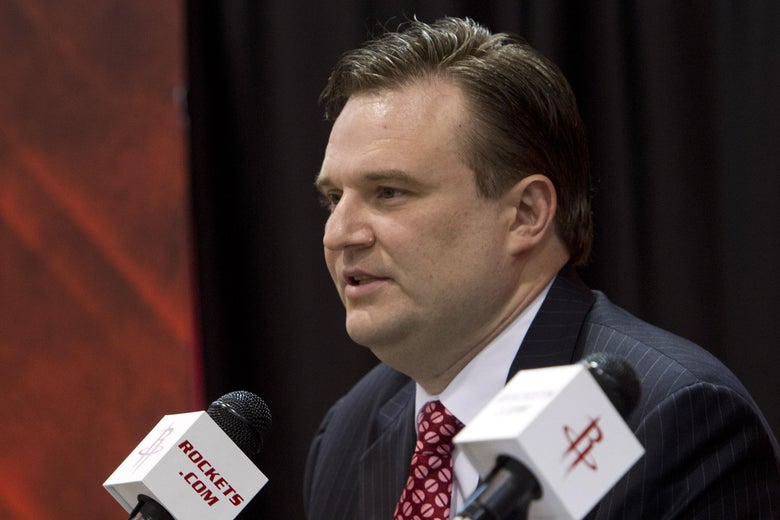
Daryl Morey, general manager of the Houston Rockets speaks during a 2012 press conference.
Bob Levey/Getty Images
If you had told me earlier this week that a powerful American executive was going to cause an international incident by tweeting about China, I would’ve felt safe in guessing that the missive would contain multiple spelling errors and would’ve been inspired by something Lou Dobbs snarled on the Fox Business Network. In reality, the instigator was Houston Rockets general manager Daryl Morey, who on Friday tweeted an image with the caption, “Fight for Freedom. Stand with Hong Kong.” It was a small gesture of support for the protesters fighting China’s incursion into the semi-autonomous region, and the post was perfectly in line with the NBA’s official stance regarding freedom of expression.
Or so it seemed. Morey quickly deleted the message, and Rockets owner Tilman Fertitta frantically distanced the organization from Morey’s sentiment with a tweet of his own.
Morey’s tweet would still be up had he expressed support for pro-democracy protests in literally any other place. But the Hong Kong demonstrators have spent the past 18 weeks confronting the NBA’s biggest global partner, and so the Rockets quickly went into clean-up mode. “We got a huge backlash, and I wanted to make clear that the organization has no political position,” Fertitta told ESPN on Saturday. Unlike Morey’s tweet, which represented a moral stance rather than a political one, the decision to remain silent—or rather, to impose silence on the Rockets organization retroactively—was actually a political maneuver, whether the Houston owner admitted it or not.
But for all his backtracking, Fertitta failed to quell the backlash. Throughout the weekend, Houston-based basketball writer Yu Fu tweeted updates as Chinese sponsors and media partners pulled their support and financing for the team.
It’s notable that this is happening to the Rockets, who have been one of the most popular NBA teams in China ever since Houston drafted Yao Ming with the No. 1 overall pick in 2002. Yao is now the chairman of the Chinese Basketball Association, yet another organization that has elected to cut ties with the Rockets.
China has tremendous leverage here. The country is by far the NBA’s biggest international market, and the league has planned its long-term growth around the basketball-mad Chinese audience. Nearly half a billion people watched NBA games in China last season. Tencent, the league’s main digital partner in the country, extended its partnership in July with a five-year contract that is worth a reported $1.5 billion. As of right now, Houston games won’t be part of Tencent’s coverage. The Wall Street Journal reports that the company “took the extraordinary step of suspending its Rockets broadcasts and effectively blacklisted one of the NBA’s most popular teams in China.”
On Sunday night, Morey attempted to walk back his initial tweet, writing a pair of both-sides-ish messages that read as though they were vetted by a small army of crisis managers, diplomats, and NBA executives.
With those tweets, Morey wasn’t just trying to salvage his franchise’s business partnerships. He was also likely trying to save his job. Earlier on Sunday, the Ringer’s John Gonzalez reported “that Rockets ownership has debated Morey’s employment status and whether to replace him.” In a better world, Morey would’ve never had to send that pair of tweets. In this world, those messages perhaps indicate that the Rockets and NBA are trying to figure out a way to placate China that doesn’t require Morey’s ouster. Consider the league’s own Sunday night statement regarding Morey’s “regrettable” tweet:
While the NBA has earned a reputation for being socially conscious, that philosophy stops at the Chinese border. The league runs a training center in Xinjiang, a region where the state has imprisoned and subjugated an entire class of people who are part of the Uighur minority. The NBA’s most progressive coaches, Steve Kerr and Gregg Popovich, have rightfully spoken out against the Trump administration’s Muslim ban. If anyone associated with the league were to bring attention to human rights abuses it’s them, but neither man publicly addressed the Chinese government’s imprisonment of roughly a million Uighurs while they were in the country with USA Basketball for this summer’s FIBA Championships.
NBA commissioner Adam Silver addressed possible tensions at the outset of a “trade war” between the U.S. and China in June. “I am not concerned at this time,” he said. “Of course, we’re not immune from global politics. It’s something that we’re paying a lot of attention to. I look, though, to sports—and this is something Yao and I have discussed—where we can use basketball maybe in the way pingpong was used in the days of Richard Nixon. There could be something called ‘basketball diplomacy.’ ”
The NBA hosts two exhibition games in China this week and Silver will be in attendance. The league has already made it clear that it won’t stand by its stated values in the face of real financial pressure. “Basketball diplomacy” was easier when was it just about tariffs.
Readers like you make our work possible. Help us continue to provide the reporting, commentary and criticism you won’t find anywhere else.
Join Slate Plusfrom Slate Magazine https://ift.tt/2MhpE1r
via IFTTT
沒有留言:
張貼留言